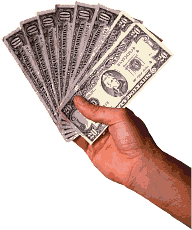‘The Tragedy of the Commissions’

Is it possible that real estate agents may someday go the way of the travel agent? Might they fade away in a nation that's wired to the Internet, do-it-yourself motivated and dedicated cheap everything?
The industry certainly seems concerned about the possibility.
At the beginning of September, the National Association of Realtors released a study that we wrote about here at The Boy in the Big Housing Bubble in a post entitled That's Realtor With a Big 'R'. The study dealt with how many homebuyers actually pay attention to whether their agent was a "Realtor," a designation that signals this agent or broker is a member of the National Association of Realtors and therefore subscribes to that organizations code of ethics. What the study found, however, was that most homebuyers haven't a clue whether their agent was a big ’R.‘
Fast forward to this week, inside the Beltway, and you'll find the NAR at a conference organized by the Federal Trade Commission and the Department of Justice antitrust division. It was a chance for the NAR to make a case for why agents and brokers should still be charging the standard 6-percent commission, or fighting to keep their compensation close to that percentage.
Real estate agents defend their six-percenter status by pointing to how little money they're making with all the competition that's out there. As reported here at The Boy in the Big Housing Bubble in August, the number of real estate agents has exploded. Our post, entitled How Many Agents, focused just on California. We pointed out that there is 1 agent to ever 14.5 owner-occupied households in California. Obviously, the market could do without a lot of those.
And so, the agents and brokers argue that they deserve that commission because they have to work so hard for it.
They say they're earning less on average than they used to just a few years ago.
But what proponents of the six-percent fee often fail to mention is the fact that, as housing prices have more than doubled in some markets in the past few years, so have commissions. A house that sold for $300,000 four years ago is selling for more than $700,000 today, which means the standard six-percent commission went from $18,000 to $42,000! Now, I know, agents are going to say that commssion is split between the buyer's and seller's representative and how the brokers take a piece as well. But the fact remains that it's always been that way. Boil it down and here's the essence — real estate agents get paid more than double what they were getting paid a few years ago to do the same work. In fact, during the boom time in this market, agents didn't have to do much work at all on the sales side. Houses sold themselves, and listing agents raked in the dough with little effort.
Has there been another commission-based industry that has seen such a dramatic rise in compensation? It's doubtful. Certainly not clothing retailers, or auto salesmen. And at who's expense has this pay increase been charged? It falls on the homebuyer, who the California Association of Realtors repeatedly points out has become increasingly unable to afford the median-priced home.
The reason all this is coming up now isn't just because real estate agents are making a bundle on each house deal. It's because of all the competition. Competitors have come up with some innovative ways to lure consumers, including cutting commissions down to flat fees, offering rebates, or reducing the percentage to unheard of levels below 2 percent. Agents in defense of the standard 6 percent are not happy about it. And they use that increased "competition" as an argument for keeping the price of their services high.
The notion that compensation must remain high because of competition begs the question of whether the laws of capitalism cease to exist once we venture into the real estate market. Why is it that, in most other markets, competition actually drives down the costs of services, but in real estate, competition is used as an excuse to keep prices high?
There's some unintentionally funny stuff in a story by Les Christie, a CNN/Money staff writer. Here's an excerpt from the story:
The NAR maintains that the industry is plenty competitive. NAR economist Lawrence Yun points out there are more than 2.5 million licensed real estate agents in the United States. A quarter of a million new ones signed up last year.The story goes on to list some of the tactics used to discourage cheaper competition, including making it difficult for non-six-percenters to list properties on the MLS, the refusal to show properties listed by the competition, and efforts to enact legislative roadblocks for competitors.
The multiple listing service (MLS), a database of properties for sale in any one area, is available to any licensed agent and member of NAR. A new agent, Yun argues, can open up next to a huge established brokerage and, with hard work, compete.
Furthermore, reports Yun, recent data compiled by Real Trend, an industry information provider, showed that commissions have in fact dropped, to an average of 5.1 percent.
Critics counter that the industry has systematically fought off innovative business models that would introduce efficiencies and save consumers billions of dollars.
One problem, said (University of California professor of economics Chang-Tai) Hsieh, is that as home prices climb, more agents enter the industry in almost lock-step. That means more and more agents fighting over business -- and a growing need to keep commissions high.
In fact, despite record prices nationally, the average broker actually closed fewer transactions and earned less – $49,000 versus $52,000 -- last year than the year before.
As a result, says Susan Creighton, the director of the Bureau of Competition for the FTC, traditional brokers try to maintain an advantage over Internet-based brokers, fee-for-service providers, and discount brokers that threaten to undermine high commission rates.
Hsieh made some observations worth a look at the end of the piece:
The real problem, which Hsieh calls "The Tragedy of the Commissions," is that all these machinations don't ultimately serve the broker, much less the public.As America continues to evolve into a do-it-yourself nation, is it possible that the need for agents will dwindle? Remember all the travel agencies you used to see before the Internet?
He suggests that the NAR abandon its attempts to prop up commissions. "Price protection," he says, "ultimately does not benefit the price protectors. The efforts are self defeating."
Hsieh says brokers spend more time prospecting for clients -- handing out business cards, cold calling, knocking on doors -- than they spend selling and marketing homes. That's just waste, of no actual value to their clients.
He doesn't necessarily have a solution. But, he says, "We should try to think of ways to create structure to channel competition that will translate into better efficiency and better prices – not waste."
— The Boy in the Big Housing Bubble




<< Home